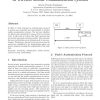Free Online Productivity Tools
i2Speak
i2Symbol
i2OCR
iTex2Img
iWeb2Print
iWeb2Shot
i2Type
iPdf2Split
iPdf2Merge
i2Bopomofo
i2Arabic
i2Style
i2Image
i2PDF
iLatex2Rtf
Sci2ools
100
click to vote
IJNSEC
2006
2006
Cryptanalysis of Park's Authentication Protocol in Wireless Mobile Communication Systems
In 2004, C. Park proposed an authentication protocol to provide user anonymity and untraceability in wireless mobile communication systems. The real user identities are hidden and randomized by means of error-correcting codes. In this work, it is shown that Park's protocol does not provide anonymity and untraceability. More precisely, the users real identities can be obtained easily by an eavesdropper. Furthermore, the protocol is not secure since the session key established in the authentication phase can also be obtained, breaking the confidentiality of the radio link.
Related Content
| Added | 12 Dec 2010 |
| Updated | 12 Dec 2010 |
| Type | Journal |
| Year | 2006 |
| Where | IJNSEC |
| Authors | Alberto Peinado Domínguez |
Comments (0)

